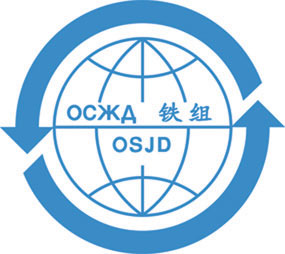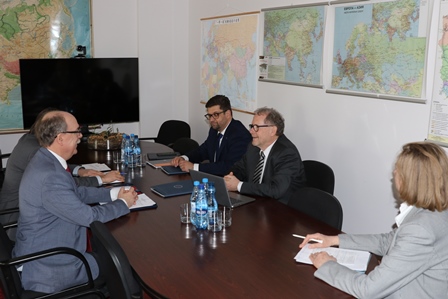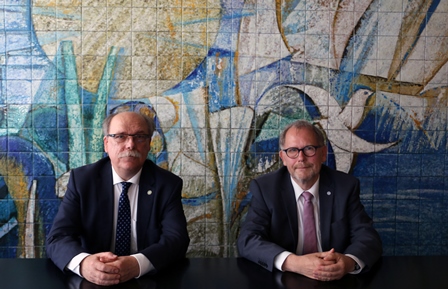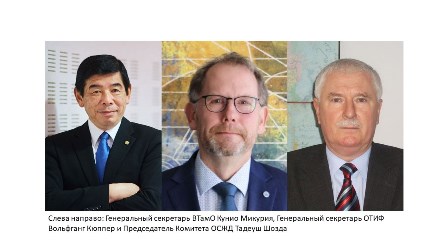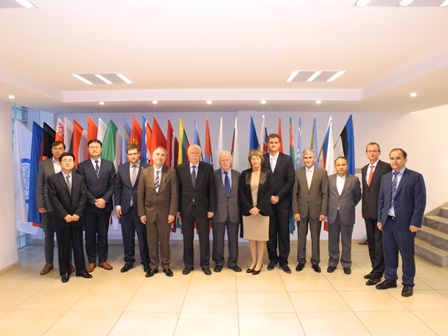Cooperation with OTIF
Working meeting between OSJD and OTIF
On 21 March 2023, a working meeting took place at the OSJD Committee in Warsaw between Mirosław Antonowicz, Chairman of the OSJD Committee, and Wolfgang Küpper, Secretary General of OTIF.
The issues discussed included the latest developments within the OSJD and OTIF framework and in the railway industry, the importance of developing international railway transport, the prospects of cooperation between OTIF and OSJD. Particular attention was paid to the OSJD participation in the work of the OTIF Ad Hoc Committee on Legal Affairs and International Cooperation.
Wolfgang Küpper provided information on the work being carried out in OTIF, including the implementation of the new Appendix H to the COTIF Convention “Uniform Rules concerning the safe operation of trains in international traffic”. It was also reported that the Luxembourg Rail Protocol to the Convention on International Interests in Mobile Equipment had so far been ratified by 4 countries and would therefore enter into force within 3 months. OTIF will act as a secretariat and supervisory body.
Under the provisions of the Luxembourg Protocol, an International Registry for Railway Rolling Stock will be set up to provide all necessary information on rolling stock and to help make its use more cost-effective.
The Secretary General of OTIF noted that the transfer of control of the International Registry maintenance to the Canadian Information Services Corporation (ISC) has been approved.
Chairman of the OSJD Commit- tee informed Wolfgang Küpper about the decisions taken within the OSJD framework, including the admission of the Lao People’s Democratic Republic to the Organisation and its accession to the SMPS and SMGS agreements.
When discussing the participation of OSJD in the work of the OTIF Ad hoc Committee on Legal Affairs and International Cooperation, it was noted that this would enable OSJD to participate as an observer in such works as revising the transport contract in terms of digitalisation, addressing issues of access to infrastructure and other.
In relation to the work carried out in the OSJD concerning the bill of lading and the possibility of transportation using the SMGS bill of lading not only in the SMGS area but also in the CIM/SMGS area, it was noted that at the moment there was no basis for the implementation of the bill of lading in the OTIF legal framework, but that this situation might change in the future. In particular, in the context of the ongoing work of the United Nations Commission on International Trade Law (UNCITRAL).
Having warmly thanked each other for the thorough discussion, both sides expressed satisfaction with the results of this high-level working meeting and stressed the importance of future contacts, which should occur at least twice a year, to discuss the latest developments in the activities of both organisations for the benefit of the development of the railway trans- port in the member countries of both organisations. Mirosław Antonowicz also invited the OTIF delegation to take part in the OSJD Ministerial Conference session (June 2023, Busan, Republic of Korea).
Meeting of the OSJD Committee Chairman with the OTIF Secretary General
(press-release)
On 30 June 2022, at the invitation of the Intergovernmental Organisation for International Carriage by Rail (OTIF), a working meeting was held at the OTIF Secretariat in Bern (Switzerland) between Mirosław Antonowicz, OSJD Committee Chairman, and Wolfgang Küpper, Secretary General of OTIF.
The agenda of the meeting included the matters related to the latest developments that took place within the framework of OTIF and OSJD, future cooperation prospects between OTIF and OSJD, the current state of international railway transport and others.
The OTIF Secretary General presented information on the decisions taken by the OTIF General Assembly, in particular, that the implementation and application of the legal documents developed within its framework is currently being monitored in the OTIF member states.
Information was also provided on the establishment of an Ad Hoc Committee on Legal Affairs and International Cooperation, which scope of activities includes the following issues:
- cooperation with international organisations, including OSJD;
- digitalisation of transport;
- implementation and application of documents;
- preparation of the OTIF development strategy until 2050;
- amendments and updates into COTIF.
The OSJD Committee Chairman has informed his counterpart about the decisions taken within the framework of OSJD.
The parties exchanged information on the progress in agreeing on the text of the draft Cooperation Agreement between the Organisation for Co-Operation between Railways (OSJD) and the Intergovernmental Organisation for International Carriage by Rail (OTIF).
On the part of OTIF, the draft Agreement was considered and preliminary agreed upon at the April meeting of the Ad Hoc Committee on Legal Affairs and International Cooperation.
At the same time, it was also noted that due to the geopolitical situation, the very signing of the Agreement in 2022 is premature.
The OSJD Committee Chairman informed that at this stage there is no unanimous support within the OSJD regarding the draft Agreement.
According to the suggestions and comments received, in-depth cooperation is not necessary and should be maintained the current level.
Taking into account these comments and suggestions, the conclusion of the Agreement looks very doubtful.
The OSJD Committee Chairman informed the Secretary General of OTIF that the participants of the meeting of the AWG of the OSJD Commission on Transport Law on the issues of the document of title noted the possibility of carrying out transportation using the SMGS bill of lading not only in the SMGS area, but also in the CIM/ SMGS space (by expanding the functions of the CIM/SMGS consignment note, taking into account the work carried out by OSJD on the SMGS bill of lading). It was agreed that this issue could be the subject of discussion by the Ad Hoc Committee on Legal Affairs and International Cooperation in October 2022.
The parties exchanged available information on the status of international railway traffic, taking into account the difficult international situation.
The Secretary General provided information on the role of OTIF under the Luxembourg Protocol on Railway Equipment to the Convention on International Interests in Mobile Equipment.
It was noted that the Luxembourg Protocol, as a new project-task, is not part of COTIF or the institutional structure of OTIF. In accordance with the provisions of the Luxembourg Protocol, an International Register of Railway Rolling Stock will be established, which will provide all the necessary information on rolling stock and will help to make the use of railway rolling stock cheaper, in particular in comparison with air mode of transport. The provisions on the International Registry have not entered into force to date. The International Registry will be deposited in Luxembourg and OTIF will act as the Secretariat. The Secretary General of OTIF noted that at the moment there is no information related to the organisational and financial aspects of the International Registry functioning. At the same time, it was stated that possible cooperation in relation to the International Registry is not within the competence of OTIF, but depends on the decision of the states concerned.
Consultative meeting between OSJD and OTIF
(press-release)
On 18 February 2022, representatives of the OSJD Committee and the OTIF Secretariat held a consultative meeting in a videoconferencing mode.
Opening the meeting, Chairman of the OSJD Committee Mirosław Antonowicz and Secretary General of OTIF Wolfgang Küpper welcomed the participants and expressed the opinion that these cyclical meetings shall be continued in the future, which would result in further successful cooperation expansion between OSJD and OTIF and would be expressed in real positive results in the work towards the unification and harmonisation of transport law aimed to ensure international railway transport in the Eurasian area.
As part of the agenda, the Parties considered:
- a roadmap for possible stages in the cooperation development between OSJD and OTIF;
- draft Agreement on Cooperation between OSJD and OTIF;
- the possibility of organising and holding a joint OSJD/OTIF conference (Forum on Railway Law).
In March 2021, the OSJD Committee received a proposal from the OTIF Secretariat aimed at implementing the idea of advanced cooperation. As a result of the discussions at the OSJD forum, the meeting of the Authorised Representatives of the members of the OSJD Ministerial Conference and the members of the Conference of General Directors of the OSJD Railways has decided that the idea of advanced cooperation between OSJD and OTIF will be discussed at the session of the OSJD Ministerial Conference in June 2022. To this end, the OSJD Committee was instructed to hold consultative meetings with the OTIF Secretariat on the issues of expanding the area of cooperation, including the task of determining the goals and objectives of such an advanced cooperation.
In December 2021, the OSJD Committee submitted a written proposal to the OTIF Secretariat to hold consultative meetings in order to substantively discuss the issues of future cooperation. This proposal was supported by the OTIF Secretariat, with the current meeting to have followed.
In his speech, Chairman of the OSJD Committee noted that the goals of cooperation between OSJD and OTIF, specified in the preamble of the draft Agreement on Cooperation between OSJD and OTIF, shall deal with all aspects of international railway transport, the management of which is within the competence of OSJD and OTIF. According to the OSJD Committee Chairman, both organisations should clarify more specific goals in the near future, based, on the one hand, on what is written in “The Common Point of View”, and, on the other hand, responding to the challenges of the modern world. An example for this are the issues of digitalisation and the development of a document of title. To achieve these goals, it is necessary to perform the following specific tasks:
- prepare, coordinate and sign an Agreement on Cooperation, if possible, no later than by the end of the current year, after signing which OSJD and OTIF will have a good tool for achieving the set goals;
- establish closer contacts between the specialists of the OSJD Committee and the OTIF Secretariat, which will make it possible to identify the areas on which cooperation should be focused;
- prepare and hold a joint Forum on Railway Law, which can become a real tool for identifying the problematic issues and the ways to resolve them.
OTIF Secretary General Mr. Wolfgang Küpper agreed with the position expressed by the OSJD Committee Chairman and stressed that cooperation between OTIF and OSJD has a longlasting and successful history.
According to the Parties, at this stage it is necessary to focus on the coordination of the draft Agreement on Cooperation between OSJD and OTIF and on signing it, which will become an effective tool and give a new impetus to the implementation of expanded cooperation.
Cooperation between OSJD and OTIF is based on the Cooperation Agreement between OSJD and OTIF dated 5 June 1991 and “The Common Point of View” dated 12 February 2003.
Taking into account the changes in the railway transport sector that have taken place over the past 20 years, the Parties came to the conclusion that it would be advisable to submit to the OSJD members a draft of a new Agreement on Cooperation between OSJD and OTIF, which would provide for expanded cooperation and, at the same time, would replace the documents defining the collaboration options at present.
After making amendments to the previously submitted draft Agreement, its agreed text was supported by the top officials of the Parties.
In the future, the Parties will begin to coordinate the text of the draft Agreement in accordance with their internal procedures in order to obtain an authority to sign it. In this regard, the Parties will inform each other about the progress of internal approvals.
When discussing the possibility of organising and holding a joint OSJD/OTIF conference (Railway Law Forum), the Parties agreed that it is necessary to focus on 2023 for its proper preparation (May or September).
The venue for the first Railway Law Forum should be a State which is a member of both organisations.
The purpose of this event should be to further develop high-quality cooperation in the field of the activities of both organisations. In case the new Agreement on Cooperation is signed, the first Railway Law Forum should be aimed at identifying those issues and problems which OSJD and OTIF specialists need to initially work out in order to increase the competitiveness of railway transport in international traffic.
JOINT STATEMENT ON GLOBAL SUPPLY CHAIN CONTINUITY DURING COVID-19 PANDEMIC
Since the World Health Organization's (WHO) declaration of the COVID-19 pandemic, borders around the world have been deeply impacted, and Customs administrations, transport authorities and the railway sector are doing their part to prevent and fight the spread of COVID-19, while trying to safeguard supply chain continuity.
International railway transport is an important backbone for the continuity of global supply chains. Now more than ever, international railway transport is playing a vital role in ensuring sustainability in the supply of goods, particularly medical and essential goods.
The World Customs Organization (WCO), the lntergovernmental Organisation for International Carriage by Rail (OTIF) and the Organisation for Co-operation between Railways (OSJD) would like to emphasize that coordination between Customs administrations, transport authorities and the railway sector, together with all the agencies involved, is critical for the continued facilitation of railway supply chains and to mitigate the overall impact of the pandemic on our societies.
As a result of COVID-19's impact on the railway industry, some railway companies are confronted with challenges in preparing and collecting paper-based documents required for Customs procedures in international railway transport.
ln this context, we would like to recall that the WCO's Revised Kyoto Convention (RKC) contains provisions enabling the application of flexible Customs procedures that allow for the acceptance of electronic documents. Noting that the RKC does not preclude Customs administrations from conducting necessary contrais, we would encourage WCO Members to facilitate railway transport by temporarily accepting electronic documents and deferring the requirement for paper-based documents until a later stage, if necessary, as stipulated in the RKC, to permit goods declarations and supporting documents to be submitted by electronic means (Transitional Standards 3.18 and 3.21, Chapter 3, General Annex).
Customs administrations are also encouraged to give due consideration to the RKC recommendation that indicates that Customs should accept as the goods transit declaration any commercial or transport document for the consignment concerned that meets all Customs requirements (Recommended Practice 7, Chapter 1, Specific Annex E).
ln addition, the WCO has launched various initiatives to ensure that the latest and most reliable information and tailored guidance reaches its Members and global supply chain stakeholders. The dedicated COVID- 19 section of the WCO website compiles all relevant existing WCO instruments and tools, HS classification reference for COVID-19 medical supplies, over 100 submissions by WCO Members on the measures implemented in response to the COVID-19 pandemic, and a paper by the WCO Private Sector Consultative Group, among others.
Since the outbreak, the Convention concerning International Carriage by Rail (COTIF) has proved its relevance and reliability. Nevertheless, the Secretariat of OTIF is working closely with OTIF Member States to resolve challenges arising from the crisis, particularly in the transport of dangerous goods, such as oxygen, in order to mitigate the restrictions during the crisis.
The ongoing COVID -19 pandemic has challenged OSJD member countries to take more decisive and better coordinated actions in the new reality. ln the period since the enactment of the restrictions in most OSJD countries and across the world to counter the spread of the pandemic, the foundational documents of the OSJD governing international railway freight transport have proven to be essential and reliable.
Nevertheless, the OSJD Committee is cooperating closely with various countries, railways, and international organizations to further improve such documents and keep them up to date to meet new challenges.
The OSJD Bulletin and OSJD website are important channels and forums for sharing and exchanging information on measures implemented by railways to ensure their uninterrupted functioning during the pandemic.
The Secretary General of the WCO, the Secretary General of OTIF and the Chairman of the OSJD Committee are convinced of the importance of multilateral cooperation to address new challenges.
JOINT STATEMENT ON GLOBAL SUPPLY CHAIN CONTINUITY DURING COVID-19 PANDEMIC - download PDF
Vehicle Keeper Marking Register (VKM) - download (PDF)
Visit of the OTIF delegation
On 21 October 2016 a delegation of the Intergovernmental Organisation for International Carriage by Rail (OTIF) headed by the Secretary General of OTIF Francois Davenne.
During the meeting questions of international railway development under the unified CIM/SMGS consignment note, the project of rail post carriages from China to Europe, the project of UNECE uniform railway law, issues of harmonization of the rules for transportation of a dangerous goods, harmonisation in the field of technical compatibility, information support for freight and passenger traffic (TAP TS1 and TAP TSÎ) and others were discussed.
Tadeusz Szozda and Francois Davenne have noted a long-lasting effective cooperation of OSJD and Intergovernmental Organisation for International Carriage by Rail on all issues of railway transport activities that has promoted to the increase in efficiency and competitiveness of the international railway traffic and further development of the Euroasian railway service.
The participants of the meeting noted that the steady growth has been observed in transportation volumes which are performed without re-wrighting the documents from one transport law onto the another due to the application of the uniform CIM/SMGS consignment note. In this regard it is important and necessary to carry out further work towards the implementation development of the uniform CIM/SMGS consignment note application and towards the creation of legal, technical and technological conditions for the application of the electronic uniform CIM/SMGS consignment note.
The parties agreed to continue cooperation towards creating favourable condition for the application of the uniform CIM/SMGS consignment note and towards speeding up the work for the preparation and application of the electronic uniform CIM/SMGS consignment note.
The meeting participants have also communicated about OSJD and OTIF participation in the work which is carried out by the UNECE Group of Experts on the uniform railway law.
The OTIF Secretariat has repeatedly suggested that an informal joint working group be established of the OSJD Committee and the OTIF Secretariat to facilitate practical application of the uniform railway law prepared by the UNECE. a task of The task of this informal joint working group would be preparation of joint proposals about the application of the uniform railway law, as well as other possible actions.
The meeting participants have noted the importance of cooperation between OSJD and OTIF in the field of updating the rules for the transportation of dangerous goods where it was possible to achieve big progress in further harmonisation of legal documents taking into account the changes and amendments in the international legal documents.
The parties have also noted positive results and feasibility of cooperation between OSJD and OTIF concerning further harmonisation of technical requirements in the field of technical interoperability.
The meeting participants have also noted that both OSJD and OTIF are concerned to ensure compatible and functional exchange of electronic data for the international railway service between various railway systems, having agreed to continue cooperation and exchange information in this area of activities.
